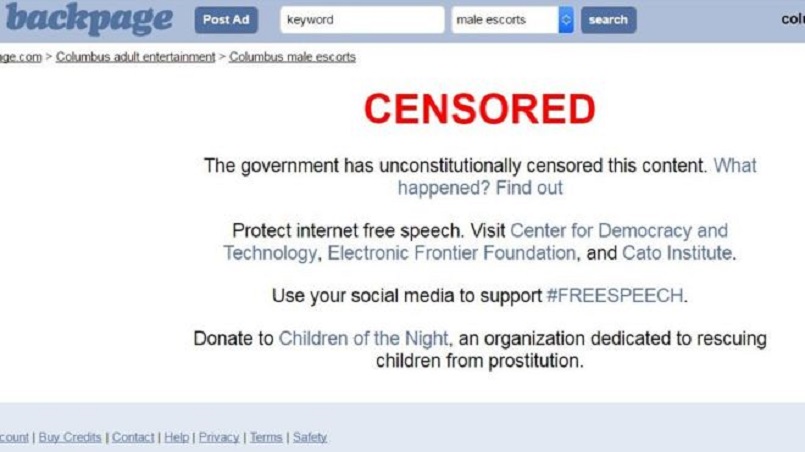
A classified advertising website accused of being a "hub" for the sex trafficking of children has shut down its adult section in the US.
The move followed the publication of a Senate report that claimedBackpage.com had "knowingly concealed evidence of criminality" by editing ads featuring words associated with child abuse.
But the site says its freedom of speech rights have been violated.
And it claims the ads had helped police track down missing children.
Links on the site to its adult section now feature the word "censored" and direct users to a page that claims the business has been a victim of "unconstitutional government censorship."
The adult section's closure had been unexpected.
Last month, a judge dismissed a case in which the Californian authorities had claimed that Backpage's chief executive and two of its ex-owners had committed pimping offences and generated millions of dollars by hosting sex trade ads.
The basis for the ruling was that US law states that website publishers cannot be held responsible for content created solely by their users.
And on Monday, the Supreme Court refused to hear an appeal filed by three women who had alleged Backpage was at fault because they had been sold as prostitutes via the site when they had been as young as 15.
The UK and other international versions of Backpage.com continue to offer their adult sections.
Incriminating phrases
The Senate's Permanent Subcommittee on Investigations described Backpage as the "world's second-largest classified advertising website", adding that the service was involved in 73% of all child trafficking reports passed from the public over to the National Center for Missing and Exploited Children (NCMEC).
It said the company was aware of the problem, but rather than block suspicious ads had set up a programme that helped remove incriminating words and phrases.
Banned terms included:
- rape
- young
- Lolita
- fresh
- schoolgirl
It said that initially these words were automatically removed by an electronic filter, and manual checks removed similar language - but the remainder of the ads were then allowed to run.
The committee added that by 2012, a different process had been put in place, which brought up an error message if the banned terms were detected.
It said these alerts identified the words that were barred, allowing users to resubmit their ads with the restricted terms removed.
'Lipstick on a pig'
The committee also presented evidence from unnamed whistleblowers, who were said to have worked for the company.
It said one had told it that the moderation team had seen it as its job to "sanitise" ads before they appeared.
"According to her, moderators 'went through the motions of putting lipstick on a pig, because when it came down to it, it was what the business was about' - that is moderating ads for prostitution," the report said.
The committee acknowledged that Backpage had passed on thousands of ads it had suspected of being related to child exploitation to the NCMEC.
But it said an internal company email dated February 2012, suggested the company might have "artificially limited" the number of such alerts.
"If we don't want to blow past 500 this month, we shouldn't be doing more than 16 a day," the email said.
"We can't ignore the ones that seem like trouble, but if we start counting now it might help us on the ones where we're being liberal."
'Totally unique'
Backpage has shared the letter it had sent to the committee defending its practices.
It said it agreed that human trafficking was "abhorrent" and added that it had spent "thousands of hours and millions of dollars" to help law enforcement tackle the problem.
It also published a statement from Children of the Night - a Los Angeles-based organisation part-funded by Backpage and dedicated to "rescuing American children from prostitution".
"The ability to search for and track potentially exploited children on a website and have the website bend over backwards to help and cooperate with police the way Backpage did was totally unique," wrote Dr Lois Lee, the organisation's founder.
"It not only made law enforcement's job easier, it made them much more effective at rescuing kids and convicting pimps."
Although Backpage's adult section is offline for now, the site indicated it might try to revive it.
"This will not end the fight for online freedom of speech," it said in a statement.
"Backpage.com will continue to pursue its efforts in court to vindicate its First Amendment rights and those of other online platforms for third-party expression."
Backpage's lawyers said executives from the company would appear at a Senate subcommittee hearing later this Tuesday, but would not testify.
